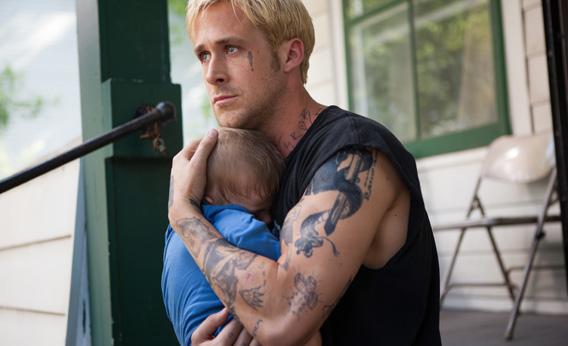Derek Cianfrance’s The Place Beyond the Pines isn’t based on a novel—the writer/director of Blue Valentine developed it from an idea originally conceived years ago in a sit-down with his friend Ryan Gosling, who stars in both films. But The Place Beyond the Pines has the feel of a not-quite-successful literary adaptation, with its three-part, generation-spanning story and carefully orchestrated recurring motifs. After the raw two-character intimacy of the end-of-love story Blue Valentine, Cianfrance has clearly decided to crank it up a notch in the ambition department. The Place Beyond the Pines aspires to be nothing less than a Greek myth transposed to modern-day Schenectady (whose name derives from a Mohawk word that translates to the movie’s title). In the interstices between the two interlocking father/son psychodramas that make up its main story, Cianfrance crams multiple motorcycle chases, bank robberies, teenage drug parties, and police corruption scandals.
With all those balls in the air (not to mention the formidable pair in the director’s britches), The Place Beyond the Pines was bound to fumble somewhere. The movie’s soulful self-seriousness, like that of its liquid-eyed hero, can occasionally slip into self-parody. But this movie confirms my Blue Valentine-based suspicion that the 38-year-old Cianfrance is one to watch. He’s capable of coaxing tremendous moments from actors, he knows how to move a camera, and as this over-laden but never boring movie shows, he’s willing to operate from a place of risk.
The film’s unusual temporal structure is perhaps its boldest gambit, but it’s also one that can’t be described in too much detail without giving away the plot. Rather than set up his multigenerational story with a flashback, or tell it by intercutting between time frames (the technique he used in Blue Valentine), Cianfrance chooses to begin in the past and move inexorably forward in time, just like … well, time. The movie is divided into three segments of roughly equal length, the first two of which take place 15 years in the past, the third in the present day. As we move from one story to the next, the consequences of one character’s fatal choice reverberate down the generations.
Gosling plays Luke Glanton, a luxuriantly tattooed motorcycle stunt rider who performs with a traveling circus. Trying to hook up with a girl he met in Schenectady on his last trip through, Romina (Eva Mendes), Luke learns that the son she’s raising with another man (Mahershala Ali) is biologically his. A single, epic instance of baby-holding clues Luke in to the joys of paternity, and he sets out on a quixotic, obsessive, and eventually violent quest to provide for his son and win back his woman. With his chop-shop buddy Robin (Ben Mendelsohn, in a more nuanced variant on the greasy sidekick he played in Killing Them Softly), Luke comes up with a scheme for robbing banks that, to the friends’ amazement, actually works—until Luke, drunk on his own success, stops listening to Robin’s advice to limit himself to one bank job a day.
Luke’s story intersects with that of Avery Cross (Bradley Cooper), a rookie cop with political ambitions. Abruptly, we take leave of Luke and his loved ones to follow Avery as he recovers from an injury sustained on duty. After reluctantly accepting a paper-pushing job at the police department, squeaky-clean Avery begins to discover that the Schenectady police force is rotten to the core (as if the iron-eyed glare of Ray Liotta as a top-ranking cop wasn’t tipoff enough).
The movie’s final section follows neither Luke nor Avery but their sons, who, 15 years after their fathers cross paths, find themselves attending the same high school. Avery’s son AJ (Smash’s Emory Cohen) is a bullying, swaggering, gold-chain-wearing meathead—Stanley Kowalski filtered through The Situation. Luke’s son Jason (Dane DeHaan) is a more fragile troubled soul. He’s pressured by AJ into stealing Oxycontin from a drug store—but when Jason starts to figure out the history that connects his father to AJ’s, there are worse crimes than theft on the horizon.
Each chapter of The Place Beyond the Pines gets successively less interesting than the last: Watching Bradley Cooper agonize over police malfeasance just isn’t as much fun as watching Ryan Gosling ride his motorcycle at top speed through a cemetery, in a thrillingly filmed but refreshingly unspectacular chase sequence. (No explosions, no 18-wheelers performing triple axels—just a man falling off his bike repeatedly and getting back on again.) The final segment, in which the teen boys half-unknowingly act out the fates decided in advance by their fathers, makes for the heaviest going of all, with both young actors delivering hyper-intense performances (Cohen’s stylized, DeHaan’s naturalistic) that don’t seem to be occurring in the same room.
But maybe that sense of progressive devolution from timeframe to timeframe suits the movie’s message, which seems to have to do with the way family stories recur through the generations as both tragedy and farce. After he steals that Oxy from the drugstore, young Jason makes his getaway on an undersized kid’s bike as the pharmacist chases after him on foot. The scene is a less-glamorous version of the Gosling character’s long-ago motorcycle chase through the graveyard, and a haunting reminder that we can never fully escape our parents’ worst choices—except, thank God, for the face tattoos.
